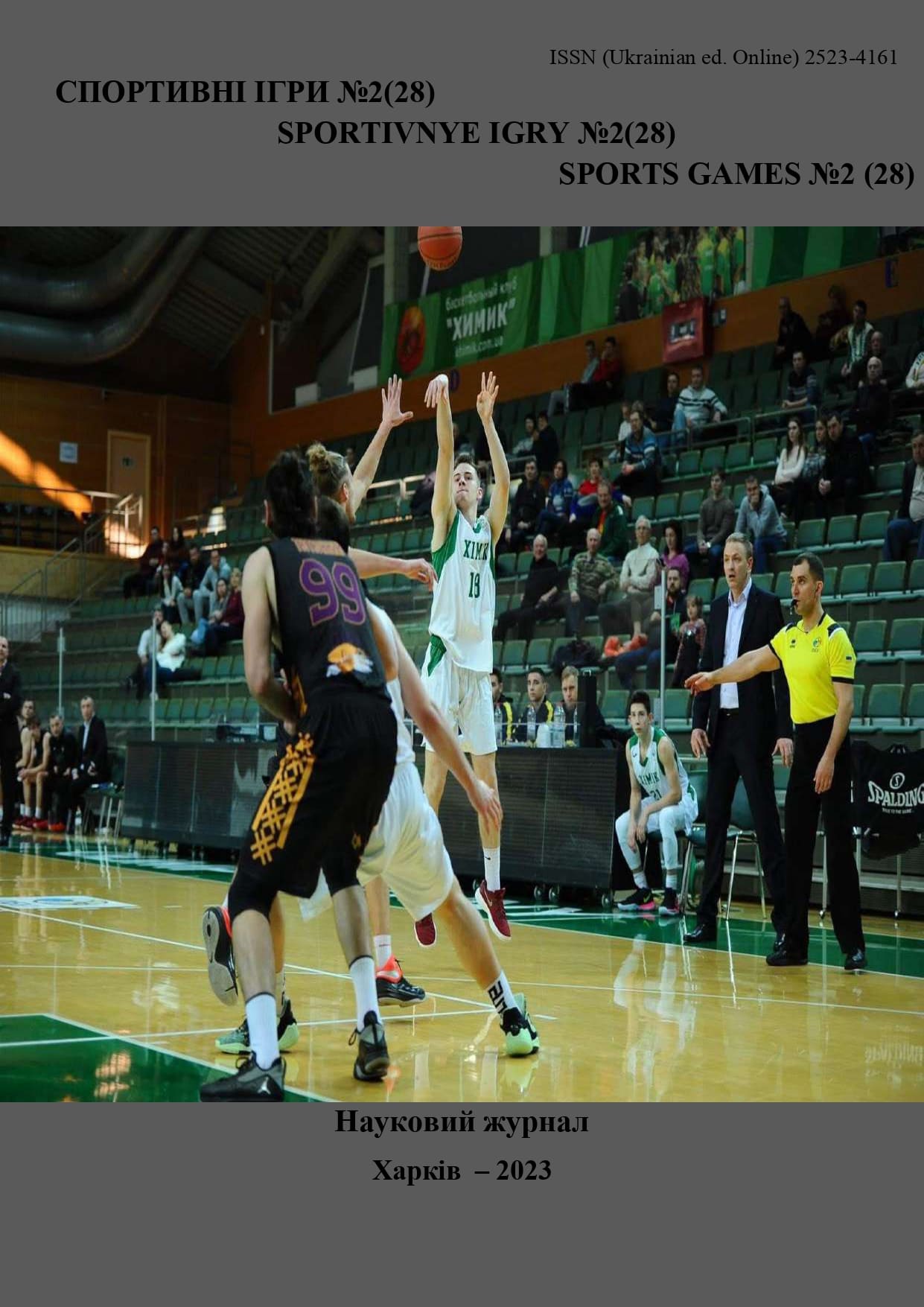Нечітко-логічна експертна система для інтегральної оцінки рівня спеціальної фізичної підготовленості баскетболістів на етапі попередньої базової підготовки
DOI:
https://doi.org/10.15391/si.2023-2.02Ключові слова:
баскетболісти, етап, попередньої, базової, підготовки, нечітка, експертна, система, нечітка, логікаАнотація
Мета даного дослідження полягає у побудові нечіткої експертної системи для оцінки рівня спеціальної фізичної підготовленості баскетболістів на етапі попередньої базової підготовкиза допомогою нечітко-логічного підходу.
Методологічну основу дослідження склали наукові праці вітчизняних і закордонних вчених і провідних фахівців. Для побудови інтегрального індикатора вводиться нечіткий висновок. В якості вхідних змінних обрано два показники. Перший показник Х1 - це результати тесту «Човниковий біг 3Х10 м з оббіганням набивних м’ячів». Другим показником X2 є результати тесту «Біг до пронумерованих набивних м’ячів». Вихідна змінна визначається показником Y, що являє “інтегральну оцінку спеціальної фізичної підготовленості баскетболістів на етапі попередньої базової підготовки“. Моделювання інтегральної оцінки та рівня спеціальної фізичної підготовленості баскетболістів на етапі попередньої базової підготовки було виконано в програмному забезпеченні Fuzzy Logic Toolbox середовища Matlab (версія R2021а) фірми MathWorks, що вплинуло на настройку і представлення дзвонуватої функції належності. Як вхідні змінні, так і вихідні перетворюються в нечіткість за допомогою побудови функцій належності. Обґрунтовано тип і параметри функції належності та обрано дзвонувату функцію належності для опису невизначеності значень, що потрапляють під нормальний розподіл. Кількість нечітких множин на кожному вході розглядається як z=3, кількість вхідних змінних як ω=2. Для досягнення повноти моделі кількість логічних правил визначалася як r=32 =9. Слід відзначити, що нечітко-логічна модель, яка була розроблена для визначення інтегральної оцінки спеціальної фізичної підготовленості баскетболістів на етапі попередньої базової підготовки, виконується за наступним алгоритмом, а саме: залучення двох показників, один з яких описує результати тесту «Човниковий біг 3Х10 м з оббіганням набивних м’ячів», а інший – результати тесту «Біг до пронумерованих набивних м’ячів»; вибір параметрів і типу функції належності для двох вхідних змінних і однієї вихідної змінної; розробка системи з створенням 9-ти логічних правил; розрахунок інтегральної оцінки спеціальної фізичної підготовленості баскетболістів на етапі попередньої базової підготовки з використанням нечіткого висновку Мамдані; та завершальна складова, - це перевірка адекватності моделі.
Посилання
Івченко, О.М. (2019). Комплексний контроль підготовленості баскетболістів на етапі попередньої базової підготовки [дисертація]. Дніпро.
Івченко, О.М. (2020). Обґрунтування контролю змагальної діяльності баскетболістів на етапі попередньої базової підготовки. Матеріали XI Міжнародна науково-практична конференція «Сучасні проблеми та перспективи розвитку фізичного виховання здоров’я і професійної підготовки майбутніх фахівців з фізичного виховання та спорту», 19-20 березня 2020 року м. Київ, 182-185.
Мітова, О.О., & Івченко, О.М. (2017). Вдосконалення системи тестів для контролю технічної та спеціальної фізичної підготовленості баскетболістів на етапі попередньої базової підготовки на основі факторного аналізу. Науковий часопис НПУ імені М.П.Драгоманова, Серія 15, 12(94), 58–62.
Мітова, О.О., & Івченко, О.М. (2020). Інтегральна оцінка та нормативні шкали оцінювання показників спеціальної фізичної підготовленості баскетболістів на етапі попередньої базової підготовки. Науковий часопис національного педагогічного університету ім. М.П. Драгоманова, 8(128), 120–124 DOI 10.31392/NPU- nc.series 15.2020.8(128).26. 2020. С. 121-124.
Мітова, О. (2020). Формування системи тестів для контролю підготовленості гравців у командних спортивних іграх. Спортивна наука та здоров’я людини, 2, 88–101.
Мітова, О., & Шинкарук, О. (2022). Обґрунтування підходу до формування системи контролю в командних спортивних іграх. Спортивний вісник Придніпров’я, 1, 191–200. DOI: 10.32540/2071-1476-2022-1-191
Мітова, О. (2022). Динаміка розвитку командних спортивних ігор як підґрунтя формування сучасної системи контролю у командних спортивних іграх. Фізична культура, спорт та здоров’я нації, 13(32), 198-211.
Мітова, О., Івченко, О., Онищенко, В., Полякова, А., & Ганчева, В. (2022). Аналіз думки тренерів щодо проблем педагогічного контролю у сучасному баскетболі. Спортивні ігри, 3(25), 86-96. doi: 10.15391/si.2022-3.08
Мітова, О., Івченко, О., Онищенко В., Полякова А., & Ханюкова, О. (2022). Визначення значущості сторін підготовленості та показників змагальної діяльності як підгрунтя розробки комплексної системи контролю гравців у баскетболі. Спортивні ігри, 4(26), 86-96. doi: 10.15391/si.2022-4.02
Платонов, В.Н. (2015). Система подготовки спортсменов в олимпийском спорте. Общая теория и ее практические приложения: учебник [для тренеров]: в 2 кн. К.: Олимпийская литература.
Поплавський, Л.Ю., & Окіпняк, В.Г. (1999). Баскетбол. Навчальна програма для дитячоюнацьких спортивних шкіл, спеціалізованих дитячо-юнацьких шкіл олімпійського резерву та шкіл вищої спортивної майстерності (навчально-тренувальні групи та групи спортивного удосконалення). К.
Поплавський, Л.Ю., Маслова, О.В., Безмилов, М.М., Мітова, О.О., Мурзін, Є.В., & Четвертак, О.А. (2019). Баскетбол. Навчальна програма для дитячо-юнацьких спортивних шкіл, спеціалізованих дитячо-юнацьких спортивних шкіл олімпійського резерву, шкіл вищої спортивної майстерності та спеціалізованих навчальних закладів спортивного профілю. Київ: Республіканський науково-методичний кабінет Міністерства молоді та спорту України.
Пегат, А. (2013). Нечёткое моделирование и управление. 2-е изд. М.: БИНОМ. Лаборатория знаний.
Sivanandam, S.N., & Sumathi, S.D.S. (2006). Introduction to Fuzzy Logic using MATLAB. Springer-VerlagBerlinHeidelberg.
Ivchenko, O., & Mitova, O. (2020). Component of psychological training of basketball players at the stage of preliminary basic training in the preparatory period. Slobozhanskyi herald of science and sport: [scientificand the oretical journal, 8 (4), 69–80.
Solovey, O.M., Mitova, O.O., Solovey, D.O., Boguslavskyi, V.V., & Ivchenko, O.M. (2020). Analys is and generalization of competitive activity result sof hand ball club sin the game development aspect. Pedagogics, psychology, medical-biological problems of physical training and sports, 01, 36-43. doi:10.15561/18189172.2020.0106
Koryahin, V., Blavt. O., Doroshenko, E., Prystynskyi, V., & Stadnyk, V. (2020). Training effect of special basketball exercises. Teorìâ Ta Metodika Fìzičnogo Vihovannâ, 20(3), 137–141.
Kozina, Zh.L., Sobko, I.N., Yermakova, T., Cielicka, M., Zukow, W., Chia, M, Goncharenko, V, Goncharenko, O, & Korobeinik, V. (2016). Psycho-physiological characteristics of female basketball players with hearing problems as the basis for the technical tactic. Journal of Physical Educationand Sport, 16(4), 261348-1359. DOI:10.7752/jpes.2016.04213
Mitova, O., Griban, G., Oleniev, D., Yakovenko, A., Onyshchenko, V., Mozolev, O., Semeniv, B., Lytvynenko, A., Khurtenko, O., Zamrozevuch-Shadrina, S., Kozibroda, L., & Hres, M. (2022). The impact of mini-basketball training sessions on the 6-7-year-old boys’ physical fitness and physical development. International Journal of Human Movementand Sports Sciences, 10 (4), 754-767. doi: 10.13189/saj.2022.100416.
Mondoni, M. (2020). General guidelines of mini basketball. Italy, Roma.
National Basketball Coaches Association (NBCA) (2017). NBA coaches play book: techniques, tactics, andteachingpoints. South Californian University in LA.
Sushko, R. & Doroshenko, Е. (2017). Рrofessionali zationissues of concernas a factor of sports games globalization (basingonbasketball). Fundamental and Applied Studiesin EU and CIS Countries : рroceedings of the VII International Academic Congress, 26–28 February 2017. United Kingdom, Cambridge, England, Vol. VII, 128–132.
Giorgio, Gandolfi (2014). NBA Coaches Playbook. Techniques, tactics, andteachingpoints. Gandolfi Giorgio. HumanKinetics.













